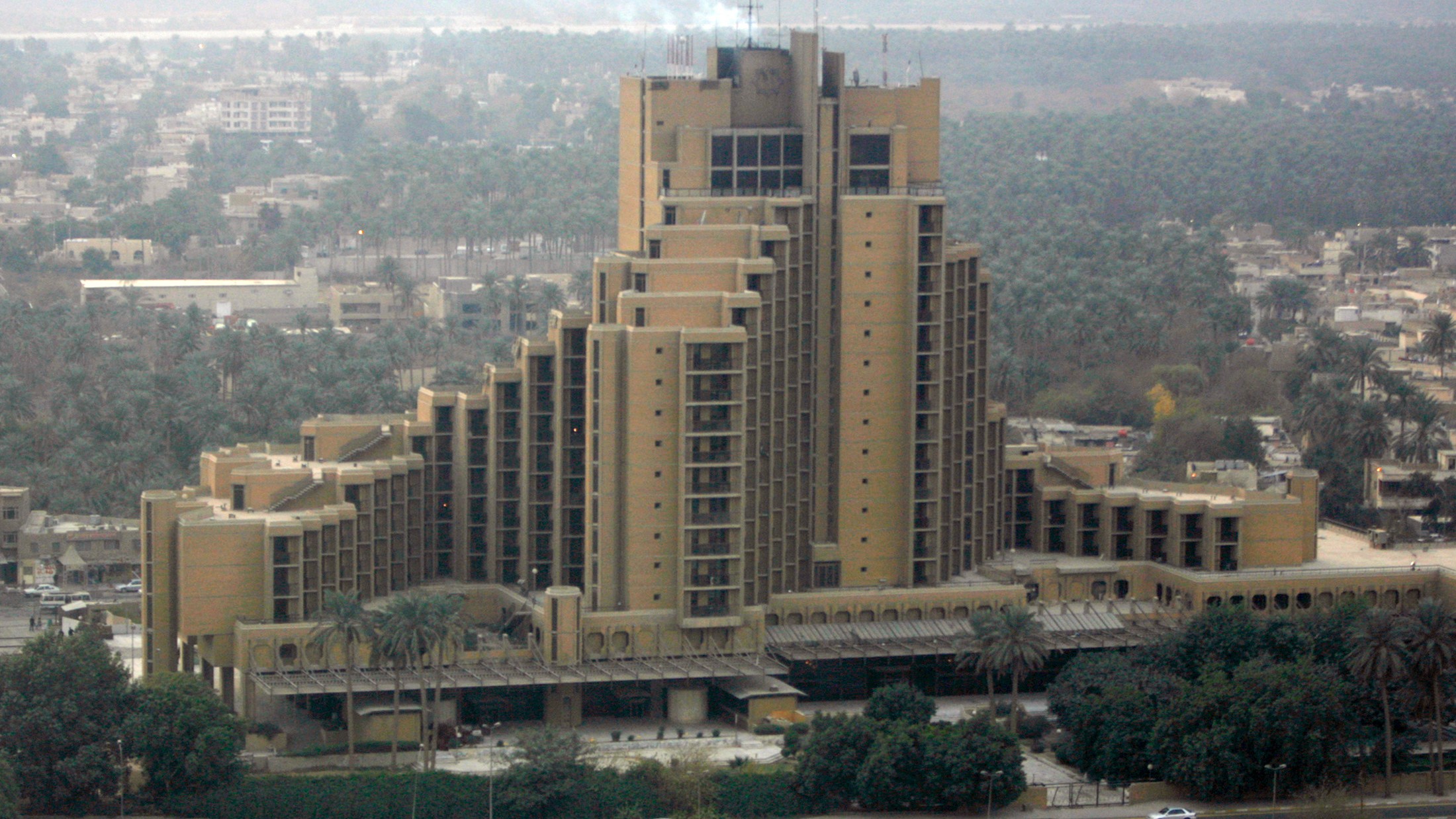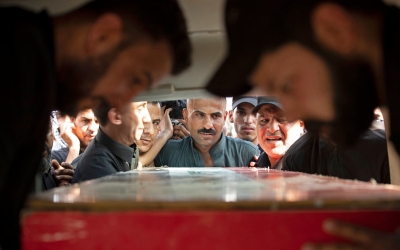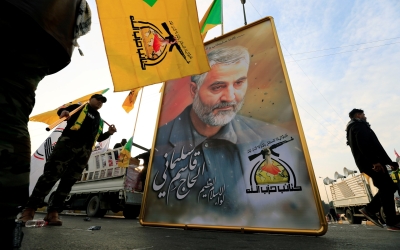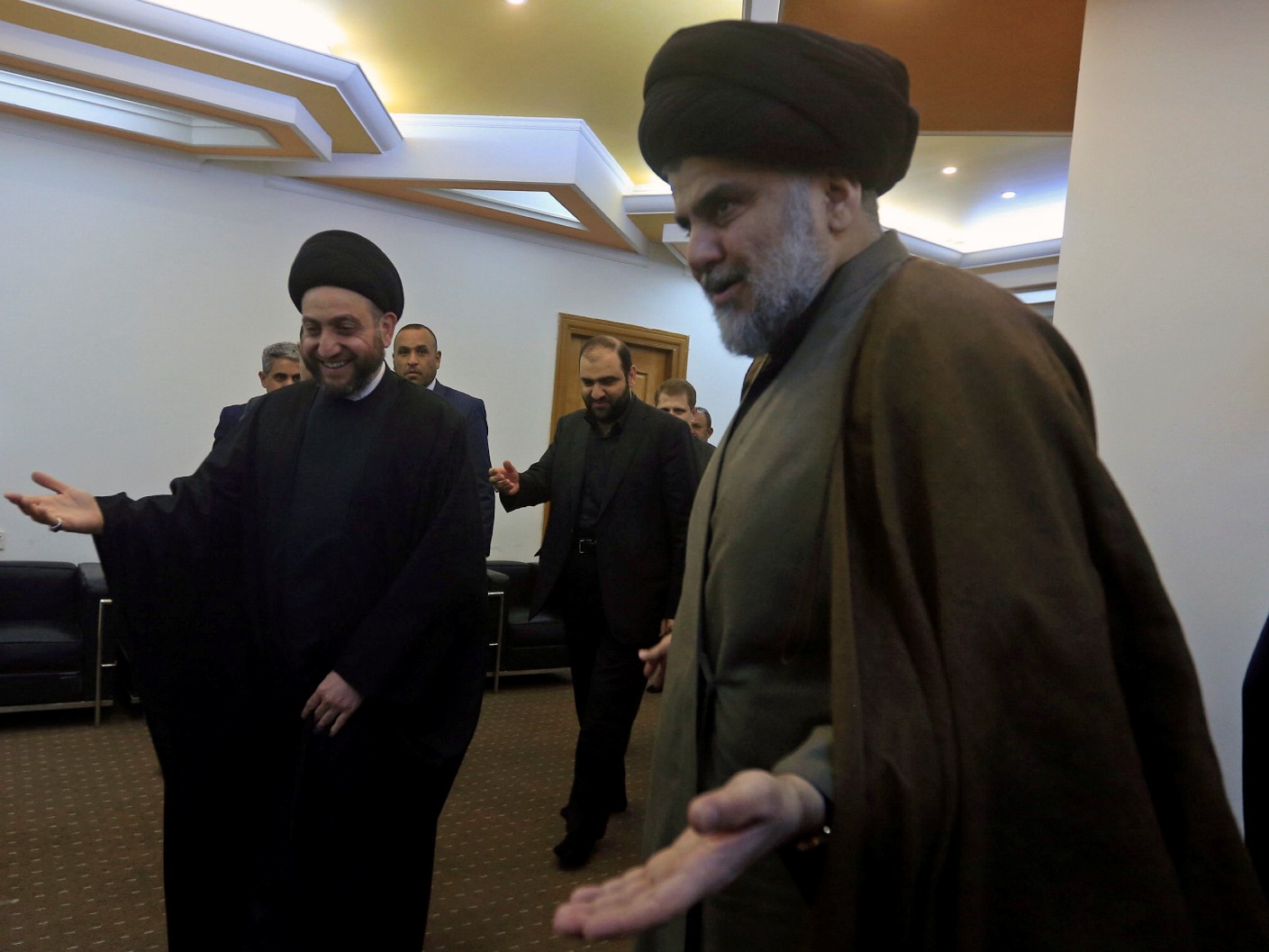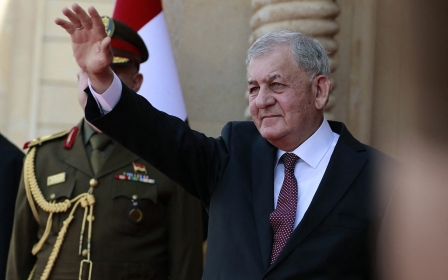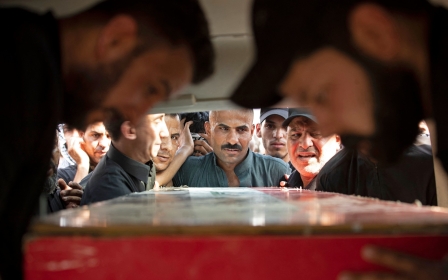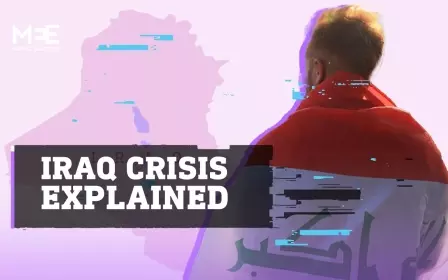Iraq: Inside Iran's plan to make Ammar al-Hakim Sadr's chief rival
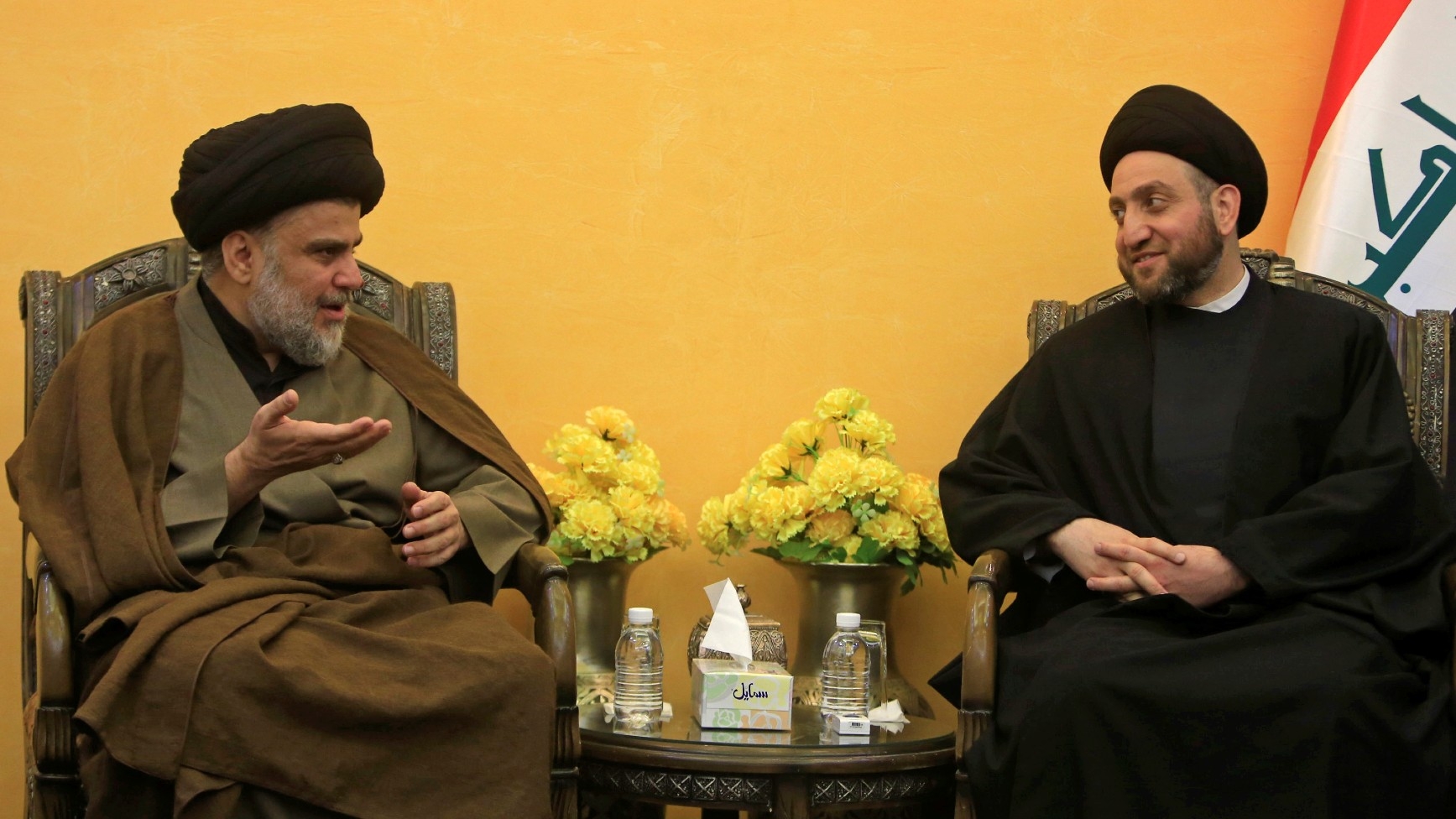
In August 2018, all eyes in Iraq were trained on the Babylon, Iraq’s most luxurious hotel, where political leaders were gathering on the banks of the Tigris to thrash out a deal to form the largest parliamentary alliance seen in the country.
Three names stood out: Muqtada al-Sadr, the influential Shia cleric, Haider al-Abadi, a former prime minister, and Ammar al-Hakim, a key Shia player.
But it wasn’t Hakim’s first meeting that day. The Babylon summit may even prove to have been the least important.
A few hours earlier, Hakim had a meeting that one of his assistants described as “seductive”.
It took place at his political headquarters, a few blocks away from Baghdad’s Babylon.
New MEE newsletter: Jerusalem Dispatch
Sign up to get the latest insights and analysis on Israel-Palestine, alongside Turkey Unpacked and other MEE newsletters
Qassem Soleimani, the Iranian general who would later be slain in a US drone strike, was there, presenting what seemed at the time to be “the opportunity of a lifetime'', a Shia political leader familiar with events told Middle East Eye.
According to Hakim’s assistant, Soleimani proposed the scion of a clerical family become the dominant figure in Iraq’s Shia politics, backed by Iran and overseeing the mosaic of ferocious armed factions. He would be given wide powers, a huge budget, and political, media and religious backing.
In return, Hakim had to forget the alliance he was about to form with Sadr and prepare for life as his rival, ready to oppose the cleric whenever necessary.
Hakim was propelled into politics in 2009 when he succeeded his father as leader of the Islamic Supreme Council of Iraq (ISCI), one of the key parties that set up Iraq’s post-Saddam political system.
But a year before the two meetings, Hakim left ISCI to establish his own project, al-Hikma, to distance himself from both the politics of his father’s old comrades and Iran, the assistant said.
That move achieved some results. Hakim emerged from the May 2018 elections with relative success, his newly formed bloc obtaining 25 seats. It was a platform he felt could propel him on the road to become a leading moderate Shia voice attractive to Shia liberals.
'From our point of view, Shia rule will not be strong and effective unless everyone is under the umbrella of the state'
- Prominent Hikma leader
Hakim rejected Soleimani's offer and went to his meeting with Sadr, which would lead to a new parliamentary bloc including most political forces not associated with Iran.
Almost five years later, "in an attempt to put their cards in order in Iraq", the Iranians tabled a similar offer to Hakim in July, Shia and Kurdish political leaders familiar with the talks told MEE.
This time the offer includes empowering Hakim politically, militarily and in the media “to be the Shia counterpart to Sadr”, several Iraqi politicians told MEE.
Both men come from two of the most famous clerical families of Najaf, and are symbolic of the religious authority associated with the holy city.
Yet in the October 2021 elections, Hakim performed disastrously, winning just two seats. Weakened, he "eagerly seized the Iranian offer, and rushed to play the role required of him in the best way", one of Hakim's prominent Shia allies told MEE.
The Iranians also began implementing some of what they promised. Media platforms and channels owned by the political forces and armed factions linked to Iran began presenting Hakim as the spearhead of the Iranian-backed Shia forces.
Hakim was able to grow his number of MPs to 11 when Sadr’s withdrew in June, and despite this modest number, he became one of three leading voices in the Coordination Framework, an alliance of Iran-backed forces. In fact, he has often been the strongest voice, bending the alliance’s direction to his will, several Framework leaders told MEE.
Militarily, Hakim’s people were granted 3,600 positions within the Hashd al-Shaabi paramilitary umbrella organisation, much of which is dominated by Iran, Hashd commanders said.
He also regained offices and equipment he lost to the ISCI in 2017.
In return, Hakim began reconciling with his old ISCI colleagues “to unify efforts and resources” of the movement of the Martyr of the Mihrab, as Hakim’s late uncle and founder of the ISCI is known, against the Sadrists, Shia leaders told MEE.
Already, Hakim’s public speech has taken a sharp turn. In a July interview with the BBC, he publicly criticised Sadr and his followers for the first time since 2003.
Hakim, who is known to be reserved with journalists, spent two-thirds of the interview answering questions related to Sadr and the actions of the cleric’s followers.
It was an “unprecedented challenge” to Sadr, said a prominent ally of Hakim. In response, Sadr’s followers shut down 15 of his movement’s offices in Baghdad and the south.
"Ammar jumped with both feet from the American trench into the Iranian trench and burned all his cards,” a Shia political leader close to Hakim told MEE.
Many Iraqi political parties and armed factions, particularly those who performed poorly, believe the US and UN conspired to manipulate the October 2021 election in some parties’ favour. Hakim is one of those who believe this to be true.
“He switched projects after his recent loss. He felt wronged and that the last [western] project in Iraq, whether intentionally or accidentally, has crushed him politically."
When asked about the Iranian scheme to create a counterweight to Sadr, three al-Hikma leaders acknowledged that it began in June and did not deny Hakim was a key player. But none of them seemed confident in its agenda, effects or those behind it.
“The Iranians tried to revive the [old] project, but there was no real and serious engagement with what they proposed," a prominent al-Hikma leader told MEE.
"The project is not feasible. It was presented as a reaction to what the Iraqi political arena is currently witnessing, and not as a conviction. The timing of the proposal is not appropriate and we do not think that the partners are ready to deal with it in a manner that satisfies us."
According to the source, Hakim will only accept the Iranian offer if three conditions are met: Iran’s proxies give up their weapons, their paramilitaries are disbanded and Iraqi law is followed.
"From our point of view, Shia rule will not be strong and effective unless everyone is under the umbrella of the state. This necessarily means that no one is above the law and no weapon is other than that of the state," he added.
"The Iranians want the whole package and are not ready to give up the weapons they control outside the umbrella of the state. This does not suit us and we do not adopt it."
Iran 'no longer strongest player'
It may be an overreach to say Iranian influence in Iraq has waned in recent years, but Iran’s ability to impose its will on Iraqi allies and opponents has certainly significantly declined.
At least, this is what the course of events suggests over the past year, a period of chaotic politics and stagnation where neither Iran’s allies nor opponents have managed to seize control.
Iraqi politicians and officials and western diplomats all note that, though three years ago Iran’s word was carried out far more easily and rapidly, Tehran has still obtained economic, financial and political gains during the government of Prime Minister Mustafa al-Kadhimi, more than ever before.
Kadhimi helped to release Iranian funds frozen by US sanctions in TBI Bank, and bills for the Iranian gas exported to Iraq are paid without any delay.
Also, Kadhimi played a pivotal role in restoring Iranian-Saudi relations, which were severed in 2016, and indirect negotiations are currently underway to resume Iranian-Jordanian-Egyptian relations with Iraq’s mediation, Iraqi officials said.
"It is the Iranian approach to working in Iraq that has differed," a senior Iraqi official close to Kadhimi told MEE.
"It is certain that they are still a very strong player in the Iraqi arena, but they are no longer the strongest player. Iran is still able to inflict heavy losses on the political process and end any political player and remove him from the game, but it is no longer able to impose the alternative that it chooses."
The “approach” that the Iraqi official refers to is the way that different branches of the Iranian authorities - the Revolutionary Guard, the intelligence, and the office of Supreme Leader Ali Khamenei - all drive policy in Iraq, with occasionally competing interests, bemusing Iraqi partners and opponents alike.
A senior commander of a prominent Iran-backed armed faction told MEE: “That confused our guys, and it still confuses most people. They have not yet understood the role-playing game that the Iranians are good at.”
The armed factions, the senior commander said, operate between two extremes: seeing someone as a sworn enemy or as a close ally. So when Tehran encourages them to change tack, "they cannot move between the two situations without losing face”.
Iran has simply been unable to overcome the absence of Soleimani and Abu Mahdi al-Muhandis, the godfather of most Iran-backed armed factions who was also killed in the same January 2020 drone strike as the general.
Without them, the Iranian-backed armed factions have repeatedly squabbled with each other, their allies and their opponents, hamstringing Iran’s ability to manoeuvre in Iraq, political leaders close to Tehran and paramilitary commanders told MEE.
With this in mind, it’s most accurate to say that we are currently seeing the effects of the Revolutionary Guard’s weakened influence playing out, the political leaders said.
“The Iranian Revolutionary Guard is at its weakest [in Iraq] now. Their tools are the same, but the mastermind [Soleimani] is absent," a Shia political leader close to Iran told MEE.
“Soleimani’s relationship with his followers was exceptional and very special. It was even stronger than their relationship with Khamenei himself.
'The Revolutionary Guard is at its weakest [in Iraq] now. Their tools are the same, but the mastermind [Soleimani] is absent'
- Shia political leader
“This relationship no longer exists, and Iranians have not succeeded in overcoming the losses caused by Soleimani's assassination in all the arenas in which he worked.”
According to the sources, Iran believes it was a mistake to concentrate so much power and responsibility in the hands of one man, as the vacuum left by Soleimani’s death has proved very damaging.
Instead, several Iraqi political leaders said, Iranian officials have forced members of the Revolutionary Guard working on Iraq to take several steps back and allow the intelligence service to mitigate the losses inflicted by Soleimani’s death.
Meanwhile, all Revolutionary Guard operations in Iraq must now be done under the supervision of Iran's National Security Council led by General Ali Shamkhani, they added.
Neither agency has the right to act or carry out any operation without Shamkhani's approval, the leaders said.
One key Shia political leader speculated that the scheme to create an alternative to Sadr could be the work of “junior” Revolutionary Guard commanders working in Iraq, who have been resisting the recent changes in tactics pursued by Iranian intelligence.
However, enabling Hakim to be a “social” match for Sadr, “is something entirely different”, a senior commander of a prominent Iranian-backed Shia armed faction told MEE.
“The Iranians are not pushing for a political or military counterpart between Hakim and Sadr. There is no idiot who does this, as the difference between the two men is too big and cannot be overlooked," the commander said.
“The proposed project aims to create a kind of social balance. A son of a clergyman vies with another son of a clergyman. It has nothing to do with the creation of symmetrical political or military forces on the ground.”
The idea, he said, was to frame Sadr as a “religious radical figure” in comparison to Hakim.
“The goal is to attract the head of tribes and Hakim has good relations with them and can be exported as a good front to develop and expand these relations.”
Turning to tribes
Iraqi society is not overtly tribal, but tribal customs nonetheless still dominate in areas where law enforcement is weak, especially in the southern provinces.
Even there, tribal sheikhs do not enjoy real influence, bar a few who have enough money and connections to secure people of their tribe jobs and therefore loyalty. This can be seen in Basra, Amarah and a number of border areas where some tribal sheikhs have mutual interests with smugglers and organised crime gangs active there.
Acquiring these tribal sheikhs’ loyalty is a tactic used by colonial powers and leaders seeking influence in Iraq since the state was established in 1921, from US general David Petraeus to former prime minister Nouri al-Maliki.
Most prominently, Soleimani and Muhandis leveraged tribal sheikhs to mobilise tribes against the Islamic State group.
Money and jobs are essential if this tactic is to succeed. They can be used to ensure tribes’ loyalty, or at least stand back from a conflict.
It is notable that Iran has begun to do the same. Iraqi officials, armed faction commanders and observers believe it means Tehran’s large-scale use of intimidation to subjugate local partners has resulted in losses, with the Iranians now preferring to use soft power.
'The Iranians are trying to rebuild their political and ideological base within the Shia community, which in recent years was undermined by the armed factions'
- Iraqi official
Hakim will not be the only Iranian ally to seek the tribes’ backing. The leaders and commanders of Iran-backed armed factions are expected to do the same soon, using tribal leaders to cement their influence in preparation for another election.
"The Iranians are trying to rebuild their political and ideological base within the Shia community, which in recent years was undermined by the armed factions. So they resorted to this classic tactic to limit these losses," an Iraqi official specialising in tribal affairs told MEE.
“Betting on tribal leaders is an expensive and exhausting bet, if not a loss, because it requires an open budget and hundreds of thousands of job vacancies,” the official added.
"Without the money and the jobs, this project would be like cutting water with a sword, and the Iranians would make no real progress.”
Middle East Eye delivers independent and unrivalled coverage and analysis of the Middle East, North Africa and beyond. To learn more about republishing this content and the associated fees, please fill out this form. More about MEE can be found here.


